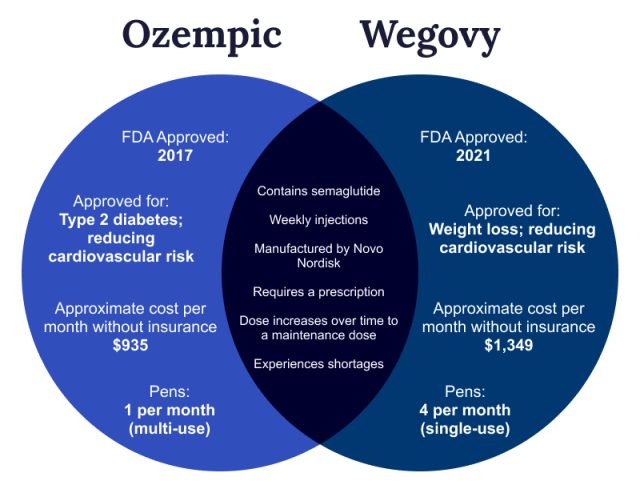
Wegovy vs Ozempic: Which Weight Loss Medication is Right for You?
With obesity rates on the rise in the U.S., more people are turning to prescription medications for effective weight management. Two of the most talked-about options — Wegovy vs Ozempic — have gained widespread attention for their role in weight loss. While both drugs share similarities, they serve different purposes and have key distinctions. Understanding these differences is crucial in determining which option is the right fit for your weight loss journey.
Understanding the Basics
Both Ozempic (semaglutide) and Wegovy (semaglutide) contain the same active ingredient and work by mimicking a hormone called GLP-1 that targets areas of the brain regulating appetite and food intake. However, they are FDA-approved for different primary purposes and come with distinct prescribing protocols.
Primary Uses and FDA Approvals
Ozempic
- Primary FDA approval: Type 2 diabetes management
- Secondary benefit: Weight loss
- Typical weekly doses: 0.25 mg to 2 mg
Wegovy
- Primary FDA approval: Chronic weight management
- Specifically approved for:
- Adults with BMI ≥30, or
- Adults with BMI ≥27 with at least one weight-related condition
- Typical weekly doses: 0.25 mg to 2.4 mg
Key Differences (Wegovy vs Ozempic)
Dosing Protocol
Wegovy follows a more gradual dose escalation pattern and reaches a higher maximum dose than Ozempic. This specific dosing strategy was designed and tested for optimal weight loss outcomes.
Insurance Coverage
Insurance coverage often differs significantly between these medications:
- Ozempic is typically covered under diabetes management benefits
- Wegovy is usually covered under weight management benefits, which may be more limited
Cost Considerations
Without insurance coverage, both medications can be expensive. Monthly costs can range from $900 to $1,400, depending on your location and pharmacy. However, manufacturer savings programs and insurance coverage can significantly reduce out-of-pocket expenses.

Wegovy vs Ozempic: Effectiveness for Weight Loss
Research shows both medications can be effective for weight loss when combined with lifestyle modifications:
Wegovy clinical trials demonstrated:
- Average weight loss of 15-17% of body weight over 68 weeks
- Significant improvements in weight-related health conditions
Ozempic studies showed:
- Average weight loss of 12-14% of body weight over similar time periods
- Improved blood sugar control in addition to weight loss
Side Effects and Considerations
Both medications share similar potential side effects:
Common Side Effects:
- Nausea
- Diarrhea
- Vomiting
- Constipation
- Abdominal pain
Serious but rare side effects:
- Pancreatitis
- Gallbladder problems
- Kidney injury
- Diabetic retinopathy complications (in patients with type 2 diabetes)
Making Your Decision
When choosing between Ozempic and Wegovy, consider:
- Primary Health Goals:
- Focus on diabetes management? Ozempic might be preferred
- Primarily seeking weight loss? Wegovy could be more appropriate
- Insurance Coverage:
- Check your specific plan’s coverage for both medications
- Consider long-term cost implications
- Medical History:
- Existing conditions
- Previous medication responses
- Risk factors for side effects
- Commitment to Treatment:
- Both require weekly injections
- Long-term use is necessary for maintained benefits
- Lifestyle modifications are essential for optimal results
The Role of Medical Supervision
Regardless of which medication you choose, proper medical supervision is crucial. Your healthcare provider will:
- Monitor your progress
- Adjust dosing as needed
- Help manage any side effects
- Provide guidance on lifestyle modifications
- Ensure safe and effective use of the medication
Conclusion
Both Ozempic and Wegovy can be effective tools for weight management when used appropriately under medical supervision. The choice between them often depends on your specific health goals, insurance coverage, and individual medical circumstances.
Recent scientific studies even suggest that patients taking semaglutide (Ozempic or Wegovy) show a 19-39% reduction in risk for multiple obesity-related cancers, with the strongest evidence for gastrointestinal cancers.
So, schedule a consultation with your healthcare provider to discuss which option might be best suited for your unique situation.
About the Author: Dr. Hina Zaman is a board-certified family medicine physician specializing in weight management, metabolic health, and other medical conditions. She helps patients achieve their health goals through comprehensive, evidence-based treatment plans at her practice in Murphy, Texas (near Dallas, TX).
Contact Information:
Family Care USA, PLLC.
Address: 318 WFM 544, Suite A2, Murphy, TX 75094
Phone: +1 469-782-0165
References and Additional Resources:
- The Obesity Society (TOS) – www.obesity.org
A scientific membership organization dedicated to advancing the science-based understanding of obesity. Their website offers evidence-based resources for both healthcare providers and patients. - Obesity Medicine Association (OMA) – www.obesitymedicine.org
A clinical organization of healthcare providers dedicated to treating obesity. They provide comprehensive education and resources about medical weight loss treatments. - National Institute of Diabetes and Digestive and Kidney Diseases (NIDDK) Weight Management – www.niddk.nih.gov
Part of the National Institutes of Health (NIH), offering research-based information about weight management and obesity treatments.



